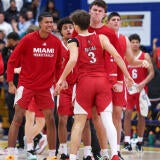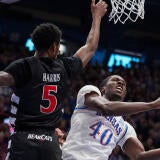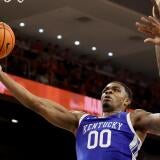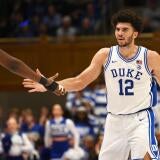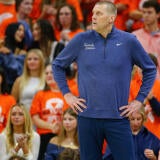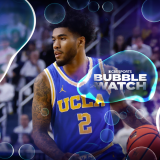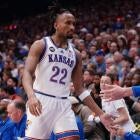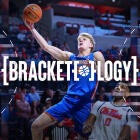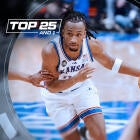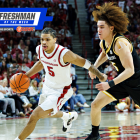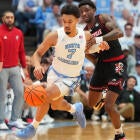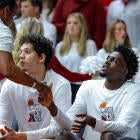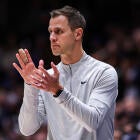AAC expert picks 2021-22: Projected order of finish, bold predictions, most overrated and underrated teams
Things are looking up in Memphis thanks to a talented roster brought in by Penny Hardaway

For a moment during last season's AAC Tournament, the league's prognosis looked particularly bleak, as Wichita State's loss to Cincinnati in the semifinals put the Shockers on the NCAA Tournament bubble and moved the conference perilously close to being a one-bid league for the first time in its history. Ultimately, though, the Shockers made it to the Big Dance, Houston made a Final Four run and Memphis won the NIT as the league made the most of an otherwise down season with a good postseason.
But with the days now numbered for Cincinnati, Houston and UCF in the AAC, the pressure is on for the league to capitalize before it loses some of its muscle to the Big 12 in the future. Charlotte, FAU, North Texas, Rice, UAB and UTSA are in line to join the league once that trio departs, but those six won't come close to replacing the basketball clout of Cincinnati and Houston.
For the sake of the league's future it would be beneficial if Memphis, Wichita State, SMU, Tulsa and Temple could start to establish themselves as the class of the new-look league by displaying the basketball acumen that has defined their programs in the past. If that group can collectively make progress in the 2021-22 season, then perhaps the AAC can position itself to retain "major conference" status among college basketball's punditry even after the Cougars and Bearcats are gone.
For now, though, Houston remains the league's most steady program, and the Cougars will try to fend off ultra-talented Memphis this season with defending regular-season champion Wichita State lurking nearby as a threat to return to the NCAA Tournament.
CBS Sports AAC Preseason Player of the Year
Tyson Etienne, Wichita State
Tyson Etienne won the AAC's Player of the Year award last season while keying an improbable regular-season league title for Wichita State during a breakout sophomore year. The 6-foot-2 long-range gunner caught fire during the Shockers' eight-game winning streak that spanned six weeks late in the season, as he averaged 18.1 points on 42.6% 3-point shooting during the span. He also turned in performance of 25, 29 and 25 points against quality foes Oral Roberts, Ole Miss and Houston earlier in the season. For such a high-usage player, Etienne takes great care of the basketball, and if Wichita State makes a return trip the NCAA Tournament, he'll be a big reason why.
CBS Sports AAC Preseason Coach of the Year
Penny Hardaway, Memphis
Early in his tenure, Penny Hardaway seemed hellbent on playing a villainous role in college basketball and sticking it to the sport's power establishment. He wanted "all the smoke," he said and has gotten plenty of it through three seasons on the job. But as Hardaway enters Year Four, the former Tigers' great and NBA All-Star is poised for a breakthrough. With the nation's No. 1 recruiting class joining an impressive nucleus of returning talent, the Tigers should make the NCAA Tournament for the first time in his tenure and advance beyond the first weekend. Perhaps the only thing that can derail him now are the repercussions from his initial brashness. The Tigers are awaiting a ruling from the IARP amid the fallout of the James Wiseman saga, and that looming decision looks far more capable of derailing this season than anything the Tigers will encounter in the AAC.
CBS Sports AAC Preseason Freshman of the Year
Emoni Bates, Memphis
Once regarded by some as the greatest high school prospect since LeBron James, Bates enters the AAC as a well-known name across the basketball landscape. The hype subsided when he stopped growing before reaching Kevin Durant's bodily dimensions, but Bates will still be an excellent college player and likely a future lottery pick in the NBA Draft. Listed at 6-foot-9 and 190 pounds, he is projected to play a point guard type role much in the way that his coach, Hardaway, once did. His chief competition for the top freshman honors will likely be teammate Jalen Duren. Together, the duo is expected to help lead Memphis to its first NCAA Tournament during Hardaway's tenure.
CBS Sports AAC predicted order of finish
The consensus order as voted by our experts with how they voted below
| 1 | |
| This may be the most talented roster in the nation, not just the AAC. Is that a guarantee of success for Memphis? No, because for all the headlines and intrigue he's generated, fourth-year coach Penny Hardaway still hasn't fielded an NCAA Tournament team. In spite of the modest on-court success — an NIT title being the crowning achievement to date — Hardaway continues to recruit better than anyone in the sport. That's led him to a crescendo season in 2021-22, in which the holdovers from previous classes and the nation's No. 1 incoming class combine to give him the highly coveted formula of elite young talent, quality experience and proven depth. Emoni Bates and Jalen Duren, the No. 4 and No. 5 players in the 2021 class, will combine with last year's leading scorers Landers Nolley and Deandre Williams to form the nucleus. The fifth starter could be the perfect compliment to that star power in proven three-and-D wing Lester Quinones. After that, the next five would likely be good enough to beat most other starting fives in the conference. Memphis has been an elite defensive squad throughout Hardaway's tenure, and the offense began coming together last season as the Tigers won 11 of their final 13 games. The only losses in that span came against Houston by a combined five points. The Tigers are clearly more talented than the Cougars this season and should beat them out for the league title -- so long as Hardaway can handle the egos and expectations that come with having a team of this caliber. | |
| 2 | |
| Houston loses three starters from its Final Four team, but the Cougars aren't going to slip much, if at all, in the AAC. That can be stated with confidence because of who is coaching the team. Kelvin Sampson has this program humming, and he's restocked the roster well enough to compensate for the departures of stars Quentin Grimes and Dejon Jarreau. Marcus Sasser will take take on the lead guard role after averaging 13.7 points last season and pair with Texas Tech transfer Kyler Edwards to comprise an elite back court. Having a fully healthy Fabian White playing with Reggie Chaney, who started 13 games last season, will give Houston's front court a baseline level of competence. Transfer center Josh Carlton from UConn will also help with rim protection. There are several candidates to step up and compliment Sasser and Edwards on the perimeter, including sophomore Tramon Mark, who made some big shots last season. A repeat of last season's 28-4 record will be tough given the quality of the Cougars' nonconference schedule, but this team will be really good again. | |
| 3 | |
| Tyson Etienne, last season's AAC co-Player of the Year, returns to anchor the reigning AAC regular-season champions. He'll have plenty of help, too, as five other players who were part of last season's rotation are back. With AAC Coach of the Year Isaac Brown now in place full-time after working wonders under the interim tag last season, this team will have a solid shot at returning to the NCAA Tournament after it was ousted in the First Four last season. Wichita State's ceiling will be determined in part, by the development of depth. Abilene Christian transfer Joe Pleasant will need to help in the frontcourt. If high-scoring Division II transfer Qua Grant from West Texas A&M can adapt his game to much loftier competition, it would keep the Shockers from relying too heavily on just a few players. | |
| 4 | |
| The Mustangs lose several producers, but they return their most important player in Kendric Davis, who led the AAC in scoring and assists last season. Davis welcomes another big-time scorer to the back court in Sam Houston State transfer Zach Nutall, who averaged 19.3 points and shot 37.2% from 3-point range while earning Southland Conference Player of the Year honors last season. Other potential impact transfers include wing Michael Weathers (Texas Southern), his brother Marcus Weathers (Duquesne) and center Tristan Clark (Baylor). Transfer forward Franklin Agunanne from Loyola Chicago could also develop into a useful piece for Tim Jankovich, who is entering his sixth season as the full-time coach. Freshmen Zhuric Phelps and Stefan Todorovic were also top-150 prospects and will help give Jankovich plenty of talented options to mold around Davis. All told, there is enough talent here for this team to make a run at the NCAA Tournament for the first time since 2017. | |
| 5 | |
| The AAC was a bad 3-point shooting league last season, but the Knights were an exception. They knocked down 35.5% of their long-range attempts and should be a solid outside shooting team once again, considering their roster returns basically in tact. There are plenty of proven options in the back court and on the wing, including a trio of Darius Perry, Brandon Mahan and Darin Green, each of whom averaged double figures and shot better than 36% from 3-point range last season. The addition of UNLV transfer Cheikh Mbacke Diong at center should give the Knights a better front court presence and keep former five-star prospect C.J. Walker from having to bruise on the block too much. With a solid bench to boot, there is a path for the Knights to make their second Big Dance under sixth-year coach Johnny Dawkins. | |
| 6 | |
| The ousting of John Brannen was unceremonious, but new coach Wes Miller's rebuild may not be too arduous. Given the league's weak lower class and the caliber of his roster, Miller has a chance to finish above .500 in the league after last year's squad finished 10-10 in the conference. Leading scorer Keith Williams transferred to Western Kentucky, but junior wing Jeremiah Davenport is back after a breakout sophomore season. Davenport, Mika Adams-Woods and David Dejulius comprise what should be a solid back court. Up front, Wake Forest transfer Ody Oguama and Mississippi State transfer Abdul Ado could be a solid front court duo. The depth looks a bit suspect, but the starting five could be solid enough to make this team better than expected. | |
| 7 | |
| Tulsa has finished with a losing record in the AAC three times under eighth-year coach Frank Haith. The first time, it bounced back with a 12-6 league record in 2017-18. The second time, it posted a 13-5 AAC mark in 2019-20. Now, after a 7-9 record in conference play last season, the Golden Hurricane will look to keep the redemption trend going. Doing so may require bounce-back transfer Jeriah Horne to have a strong season. After transferring to Colorado last season and averaging 10.8 points for the Buffaloes, the sixth-year senior forward is back to anchor what should be one of the league's better front courts. Rey Idowu stepped in and filled much of Horne's production void last season, and if the two can play well together, it'll make Tulsa a tough matchup for some of the AAC's lean front lines. Guard play is a bit of a question, but if UT-Arlington transfer Sam Griffin can translate his 39% 3-point shooting to a better league, it would be a big help. | |
| 8 | |
| If nothing else, Temple will be healthier and have a more coherent season in 2021-22 after it was pillaged by injuries and COVID-19 disruptions last season. Butler transfer Khalif Battle showed enough promise in 11 games last season to earn All-AAC third-team honors and could be a force. The concern for the Owls is outside shooting amid the departure of long-range weapons Brendan Barry (45.3%) and J.P. Moorman (35.8%). If Jeremiah Williams and Damian Dunn can improve their outside shooting after strong freshman seasons, Temple could surprise some folks in Aaron McKie's third season as coach. It would also be a huge help if Wake Forest transfer center Emmanuel Okpomo can consistently provide the rim protection ability he flashed in limited action with the Demon Deacons as a freshman. | |
| 9 | |
| After seasons of 4-14 and 4-12 in AAC play to begin his tenure, third-year coach Ron Hunter will hope the addition of a few transfers and the maturation of a young roster will result in progress. The Green Wave didn't have a single senior last season, and it showed. But with leading scorer and All-AAC first-team honoree Jaylen Forbes back for his third season of college basketball and second at Tulane, Hunter has a centerpiece to build his team around. Forbes' 36.8% 3-point shooting mark led a team that ranked 323rd nationally in 3-point shooting percentage at 29.8%. He should get some help on the outside shooting front with the additions of transfers Devon Baker (UNC Asheville), Jalen Cook (LSU) and Scott Spencer (La Salle). But the Green Wave are lean up front and don't look talented enough to finish in the AAC's top half yet. | |
| 10 | |
| After going 24-14 (8-10 AAC) in the 2018-19 season, USF regressed the past two seasons. Looking at their roster, it's hard to imagine the Bulls improving much from last season's 9-13 (4-10) record. Five of the top six scorers are gone from last season's team, and they have been replaced mostly by transfers. Three of them — forward Jalyn McCreary (South Carolina), guard Serrel Smith Jr. (Maryland) and Corey Walker (Tennessee) — have power conference experience. The top returner is guard Caleb Murphy, an AAC All-Freshman honoree. If Murphy can develop his outside shot and get some scoring help, USF could improve. But there are a lot of new pieces fifth-year coach Brian Gregory must fit together if this program is going to gain footing. | |
| 11 | |
| With certified bucket-getter Wynston Tabbs transferring in from Boston College, the Pirates have a potential replacement for the offensive output of outgoing Virginia transfer Jayden Gardner, who scored 1,462 points in three seasons with the Pirates. Between Tabbs, Brandon Suggs, J.J. Miles, Tremont Robinson-White and Tristen Newton, ECU is well-stocked at guard and on the wing. Arkansas transfer Vance Jackson may have to bruise on the block a bit more than in his previous three collegiate stops. But Tabbs and Jackson should help this team improve on its poor 30.4% team 3-point shooting mark from last season, and that should give the Pirates a solid chance to outplay this dismal projection. | |
Most overrated team
Tulsa
It's not a huge discrepancy, but two colleagues project Tulsa to finish sixth in the league, as you'll see below. By contrast, the league's coaches project the Golden Hurricane to finish seventh. The latter seems more likely, and guard play is the reason why. The AAC is filled with high-quality lead guards. Tulsa may find one during the season, but there's not one jumping off the page yet. With Brandon Rachal and Elijah Joiner departed, the pressure will be on returning guards Darien Jackson, Keyshawn Embery-Simpson and Curtis Haywood II to step up offensively. Transfers Sam Griffin (UT-Arlington) and Ladavius Draine are candidates to bring buckets as well. But, on the whole, Tulsa's guard situation looks bleaker than anyone else's in the league aside, perhaps, from South Florida.
Most underrated team
Temple
Temple's start and stop 2020-21 season amid the COVID-19 pandemic was an incoherent mess further convoluted by injuries. The Owls finished just 5-11 (4-10 AAC), with their final six losses all coming by single digits as the roster became competitive but struggled to close tight games. Now, the Owls are a seasoned group that should be able to compete with almost anyone in the league, aside from maybe Memphis and Houston. Though lean up front, their backcourt looks solid, and there is a chance for third-year coach Aaron McKie to guide the Owls to a .500 or better mark in the AAC.


















